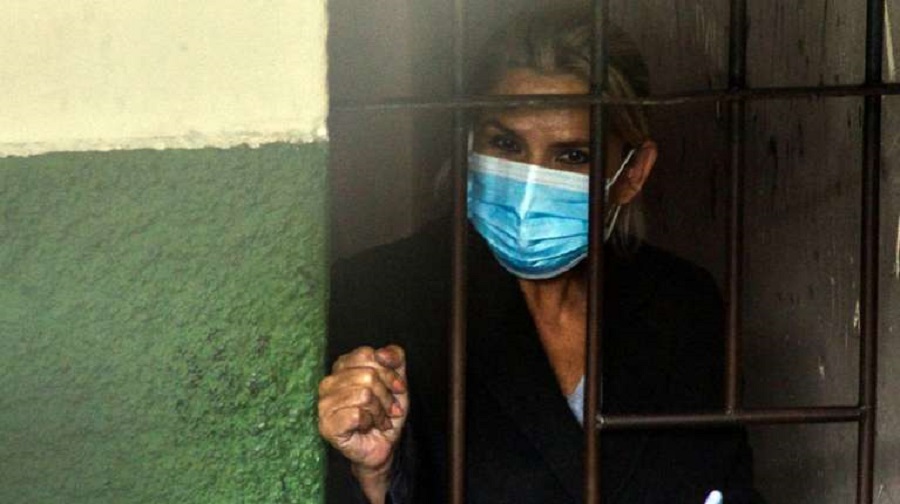RIO DE JANEIRO, BRAZIL – It was the early morning of March 13, 2021. Jeanine Áñez, interim president of Bolivia between 2019 and 2020, left her home under arrest, accused of being the co-perpetrator of a coup d’état. Six months later, the right-wing ex-president awaits her trial.
“The political persecution has begun,” tweeted the right-wing ex-president hours before her arrest in the Amazonian department of Beni, where she is from.

In pre-trial detention in La Paz, the 54-year-old attorney and TV hostess is accused of having promoted an alleged coup d’état against her predecessor, leftist Evo Morales (2006-2019).
She is facing three lawsuits in the ordinary court system for genocide, terrorism, sedition, conspiracy, resolutions contrary to the Constitution and dereliction of duty. In addition, she could face four accountability trials, subject to approval by 2/3 of parliament.
COMPROMISED HEALTH
The ex-president injured herself on August 21 in prison by cutting her arm. Days earlier, a doctor had diagnosed her with “hypertension and depressive anxiety syndrome.” As a result, her family repeatedly requested, to no avail, that Áñez be allowed to defend herself in freedom or, at least, under house arrest.
Pointing out “attacks on the life (…) of the former president,” her defense requested precautionary protection measures for her client to the Inter-American Commission on Human Rights (IACHR) and is still awaiting the body’s decision.
“Evo Morales (…) has her as a trophy to send a message of fear to all opposition leaders and to all Bolivians who think differently,” said Carolina Ribera, Áñez’s daughter.
JUSTICE UNDER SCRUTINY
Áñez was second vice president of the Senate when she was proclaimed interim president of Bolivia on November 12, 2019 amid strong social upheaval.
She came to power through a challenged constitutional succession by vacancy after Morales’ resignation, whom the opposition accused of rigging the October elections that year in order to be able to extend his term in office until 2025. After losing the support of the military, Morales resigned and went into exile.
“The alternatives were very complicated at that time and the far right tried to seize the opportunity to impose itself,” explained political scientist Marcelo Arequipa. “They did not wait for the democratic path; they tried as quickly as possible to impose someone who would take control of the state.”
Last November, Añez transferred power to Luis Arce, Morales’s favorite, the winner in new elections. She was arrested in March. But her daughter assures that there is no evidence to support the charges against her. “In Bolivia, justice is completely manipulated and servile to the government,” denounced Ribera, pointing the finger at Arce and the Morales-led Movimiento al Socialismo (MAS).
HARSH REPORT
Áñez was accused of genocide based on the denunciation of relatives of victims of the repression by security forces on November 15, 2019 in the town of Sacaba, near Cochabamba, and on November 19 in Senkata, an area of El Alto, neighboring La Paz.
The Interdisciplinary Group of Independent Experts (GIEI), created in December 2019 by an agreement between the Bolivian government and the IACHR, in a recent report listed 22 deaths in both incidents, which it described as massacres.
“Áñez has a very complicated scenario because the GIEI report is practically a very harsh sentence for her,” Arequipa said. “Even if the coup trial does not prosper, I believe that the Sacaba and Senkata case will heavily convict her.”
On the other hand, the same report challenges the independence of Bolivia’s judicial system. The document warns of the need to review the existence of “ambiguous criminal offenses, such as terrorism, sedition and dereliction of duty” – several of which Áñez is accused of – to prevent their use “in an arbitrary manner.”
For Arequipa, it is “inconsistent” that MAS should use the legal figure of “terrorism” that it previously criticized Áñez for having employed “to detain activists against its government.”

